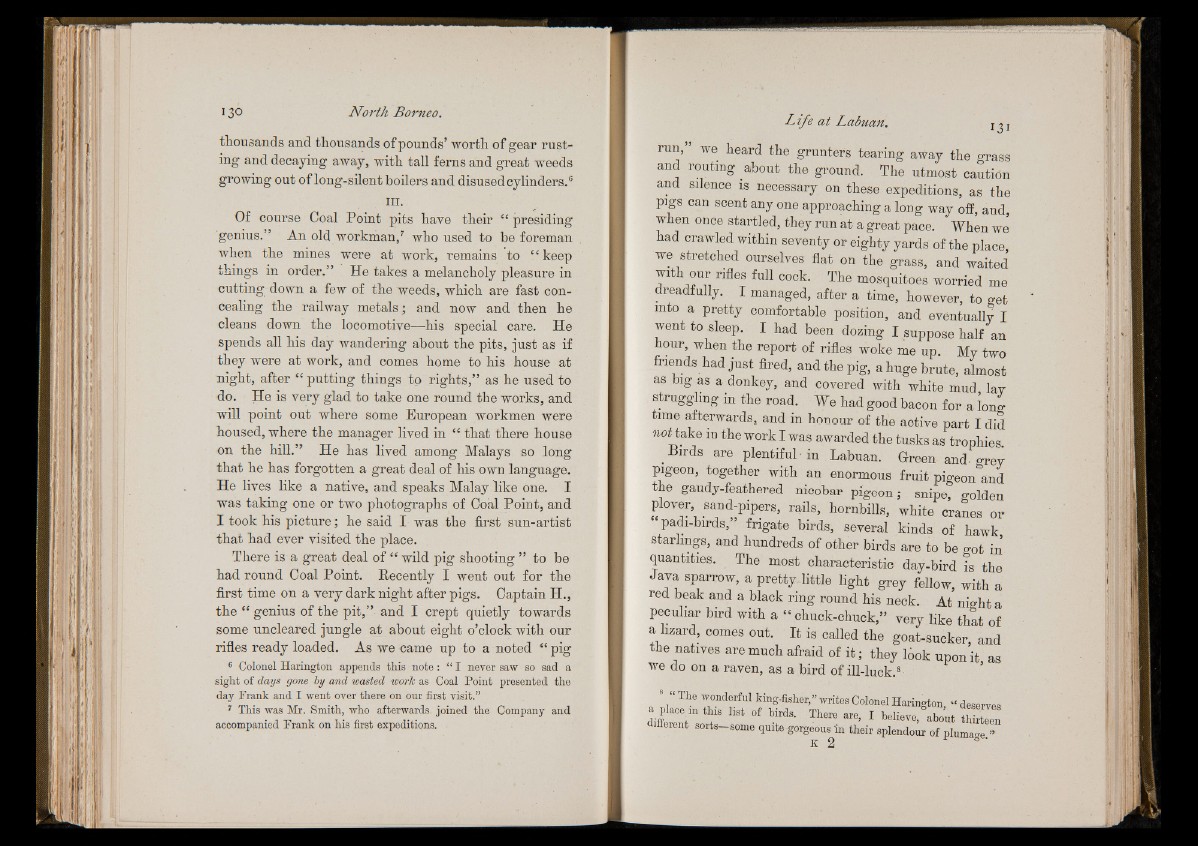
thousands and thousands of pounds’ worth of gear rusting
and decaying away, with tall ferns and great weeds
growing out of long-silent boilers and disused cylinders.6
m .
Of course Coal Point pits have their “ presiding
genius.” An old workman/ who used to be foreman
when the mines were at work, remains to “ keep
things in order.” He takes a melancholy pleasure in
cutting down a few of the weeds, which are fast concealing
the railway metals; and now and then he
cleans down the locomotive—his special care. He
spends all his day wandering about the pits, just as if
they were at work, and comes home to his house at
night, after “ putting things to rights,” as he used to
do. He is very glad to take one round the works, and
will point out where some European workmen were
housed, where the manager lived in “ that there house
on the hill.” He has lived among Malays so long
that he has forgotten a great deal of his own language.
He lives like a native, and speaks Malay like one. I
was taking one or two photographs of Coal Point, and
I took his picture; he said I was the first sun-artist
that had ever visited the place.
There is a great deal of “ wild pig shooting ” to be
had round Coal Point. Recently I went out for the
first time on a very dark night after pigs. Captain H.,
the “ genius of the pit,” and I crept quietly towards
some uncleared jungle at about eight o’clock with our
rifles ready loaded. As we came up to a noted “ pig
6 Colonel Harington appends this note : “ I never saw so sad a
sight of days gone by and wasted work as Coal Point presented the
day Frank and I went over there on our first visit.”
7 This was Mr. Smith, who afterwards joined the Company and
accompanied Frank on his first expeditions.
run, we heard the grunters tearing away the grass
and routing about the ground. The utmost caution
and silence is necessary on these expeditions, as the
pigs can scent any one approaching a long way off, and,
when once startled, they run at a great pace. When we
had crawled within seventy or eighty yards of the place,
we stretched ourselves flat on the grass, and waited
with our rifles full cock. The mosquitoes worried me
dreadfully. I managed, after a time, however, to get
into a pretty comfortable position, and eventually I
went to sleep. I had been dozing I.suppose half an
hour, when the report of rifles woke me up. My two
lends had just fired, and the pig, a huge brute, almost
as big as a donkey, and covered with white mud, lay
struggling in the road. We had good bacon for a long
time afterwards, and in honour of the active part I did
not take m the work I was awarded the tusks as trophies.
Birds are plentiful-in Labuan. Green and- grey
pigeon, together with an enormous fruit pigeon and
e gaudy-feathered nicobar pigeon; snipe, golden
plover, sand-pipers, rails, hornbills, white cranes or
“ padi-birds,” frigate birds, several kinds of hawk
starlings, and hundreds of other birds are to be got in
quantities. The most characteristic day-bird is the
Java sparrow, a pretty little light grey fellow, with a
red beak and a black ring round his neck. At night a
peculiar bird with a “ chuck-chuck,” very like that of
a lizard, comes out. I t is called the goat-sucker, and
the natives are much afraid of i t ; they look upon it, as
we do on a raven, as a bird of ill-luck.8
8 “ The wonderful king-fisher,” writes Colonel Harington, J deserves
diffe Y n i i hSt °f birdS> There M 1 believe’liferent sorts-some quite gorgeous in their splendou r aobfo pultu mthaigrtee.e”n
x 2